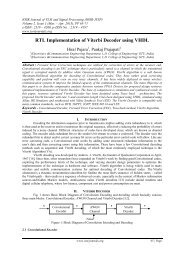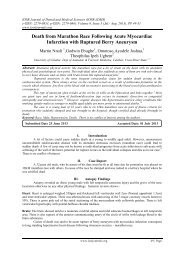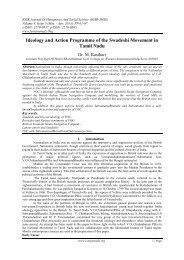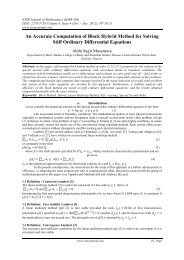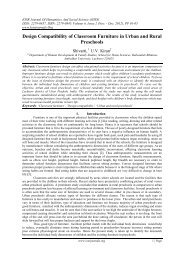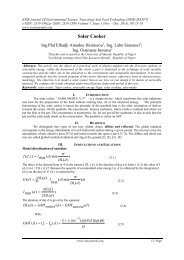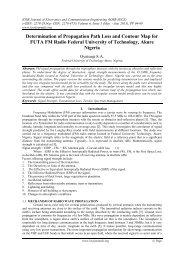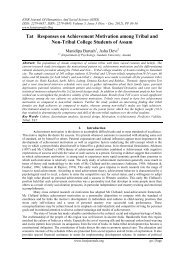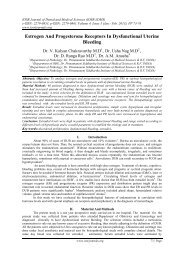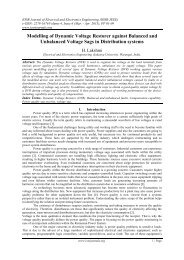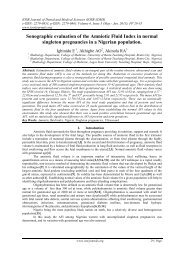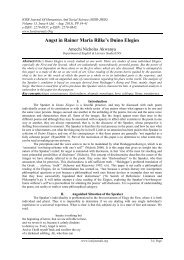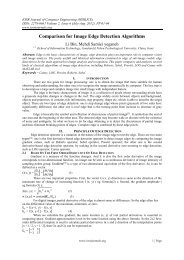Initial Conquest of India by Turks and Their Slaves - IOSR
Initial Conquest of India by Turks and Their Slaves - IOSR
Initial Conquest of India by Turks and Their Slaves - IOSR
You also want an ePaper? Increase the reach of your titles
YUMPU automatically turns print PDFs into web optimized ePapers that Google loves.
Internal Conflicts <strong>and</strong> African Development: The Nigerian Experience<br />
provides a big family stance for Africa, Legislate for continental development, settle conflicts or better still,<br />
prevent conflict as well as present a solid political structure enough to cut <strong>of</strong>f imperial encroachment. Conflicts<br />
within countries (as we have now) misdirect these political bodies, divide them <strong>and</strong> hinder their progress.<br />
VII. Economic Consequences<br />
Literature on conflict has more patronage <strong>of</strong> economic discussion on consequences (See Oluyole, 1958;<br />
lauer, 1978; Ikpeze, 1997). This underscores the fact that the economic cost <strong>of</strong> conflicts is much. One economic<br />
truth that is constant for ages now is that resources are scarce <strong>and</strong> needs is at the same time innumerable. For<br />
this, human being have to ration their need according to mean to exist <strong>and</strong> develop. Issues pertaining to the<br />
allocation <strong>of</strong> society’s resources to competing ends are therefore, for the same reason above, central in the<br />
interface between armed struggle (whether intra or inter-country) <strong>and</strong> economic growth <strong>and</strong> development.<br />
Economic growth, defined simply as a statistical increase in the Gross National Product (GNP) depend inter-alia<br />
on resources availabilities (Ikpeze, 1997:1). Economic development on the other h<strong>and</strong>, denoting an “upward<br />
movement <strong>of</strong> the entire social system according to Myrdal (1968:189), depends not only on resource<br />
availabilities but also on the pattern <strong>of</strong> resource use <strong>and</strong>, in particular, on the composition <strong>and</strong> distribution <strong>of</strong><br />
output.Based on the above, a submission could be made that anything that causes distortion towards the<br />
achievement <strong>of</strong> the above, hinders economic growth <strong>and</strong> development. This is what military expenditure<br />
(specifically) <strong>and</strong> conflict (generally) tends to achieve in a country’s economy. According to Ikpeze (1997:1),<br />
for the entire social system to experience an upward shift, the structure <strong>of</strong> production has to tilt in favour <strong>of</strong><br />
civilian consumption, there has to be greater participation <strong>by</strong> the citizenry in the production <strong>of</strong> the GNP, <strong>and</strong> the<br />
national income must be more equitably distributed, even as its rate <strong>of</strong> growth is increasing. He went further,<br />
that given that resources are everywhere scarce relative to needs, all military uses <strong>of</strong> resources are bound to<br />
compromise economic development because they divert resources away from civilian application, example<br />
education, health <strong>and</strong> physical infrastructure. Sharing the same opinion, Oyediran (1979:43-46) state that all the<br />
period <strong>of</strong> war, there is acute imbalance in budgetary allocations as defence or military allocations are given<br />
priority over <strong>and</strong> above other sectors <strong>of</strong> the economy, as during the Nigerian civil war. To see <strong>and</strong> appreciate the<br />
contrast between the magnitude <strong>of</strong> global military outlay <strong>and</strong> basic human needs in less developed countries (see<br />
Ikpeze, 1997; United Nations Study Series, 1983; McHale, 1969 etc).<br />
Before going into the analysis <strong>of</strong> the economic effects on conflict, it should be in place to state that<br />
African countries, precisely, Sub-Saharan countries have for the reasons <strong>of</strong> proliferation <strong>of</strong> armed conflict<br />
within states tended to consistently in recent year, spent a higher proportion <strong>of</strong> the GDP on military than<br />
industrialized nations (see Human Development Report, 1994; <strong>and</strong> Ikpeze, 1997:3).<br />
Financial expenditure is not the only form <strong>of</strong> economic cost <strong>of</strong> a conflict/war. They still include; natural<br />
resources (minerals <strong>and</strong> raw materials), human resources (manpower), <strong>and</strong> material resources (capital <strong>and</strong><br />
technology), at any point in time, these resources are finite…. And given that they are finite, their allocation to<br />
military purposes,<br />
i. Necessarily compete with the allocation for socio-economic development;<br />
ii. Is liable to distort priorities in the allocation <strong>of</strong> resources not used directly <strong>by</strong> the military sector, <strong>and</strong><br />
iii. Can aggravate conflict situations emanating from resource constraints with the risk <strong>of</strong> diverting additional<br />
resources to military uses. Financial outlays therefore are incapable <strong>of</strong> capturing the ramification alone.<br />
In comparison, the opportunity cost <strong>of</strong> armed conflict in terms <strong>of</strong> diversion <strong>and</strong> distortion encompasses<br />
i. The industrial production (forgone)<br />
ii. The depletion <strong>of</strong> important <strong>and</strong> non- renewable minerals, notably those used either in the manufacture <strong>of</strong><br />
military equipment (Aluminum, copper, Nickel, platinum) used in military operation (petroleum);<br />
iii. The diversion <strong>of</strong> a significant proportion <strong>of</strong> scientific <strong>and</strong> Research <strong>and</strong><br />
Development (R&D) efforts to military purposes;<br />
iv. The assignment <strong>of</strong> an undue proportion <strong>of</strong> the population as the regular soldier, Para-military forces, <strong>and</strong><br />
civilians in defence activities;<br />
v. Competition with civilian dem<strong>and</strong>s for l<strong>and</strong> (what ever purpose, be it industrial, agricultural, recreational, or<br />
environmental) (Ikpeze, 1997:11-12).<br />
This situation it must be emphasized is applicable to both international <strong>and</strong> internal conflicts.<br />
Conflicts lead to high importation <strong>and</strong> depletion <strong>of</strong> foreign reserve, it diverts resources from the said country’s<br />
economic capacity to produce basic goods <strong>and</strong> services <strong>and</strong> thence avoid scarcities in future. The above two,<br />
conspire to put pressure on prices, <strong>of</strong>ten leading to the institution <strong>of</strong> cumbersome controls (such as rationing),<br />
<strong>and</strong> foster the development <strong>of</strong> an underground economy with its attendant distortion. This also leads to severe<br />
scarcity. It also leads to the flight <strong>of</strong> the existing capital away from the country or Zone in conflicts. In Nigeria it<br />
led to even brain drain, sanctions <strong>and</strong> others.<br />
Conflict <strong>and</strong> war also lead to dislocation <strong>of</strong> people from their base. This leads to disruption <strong>of</strong><br />
economic activity, unemployment, <strong>and</strong> underemployment for those not engaged in military operation <strong>and</strong><br />
www.iosrjournals.org<br />
28 | Page



